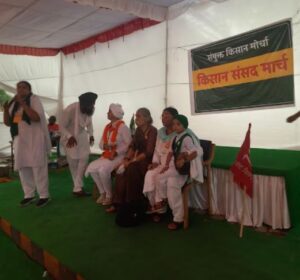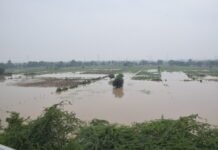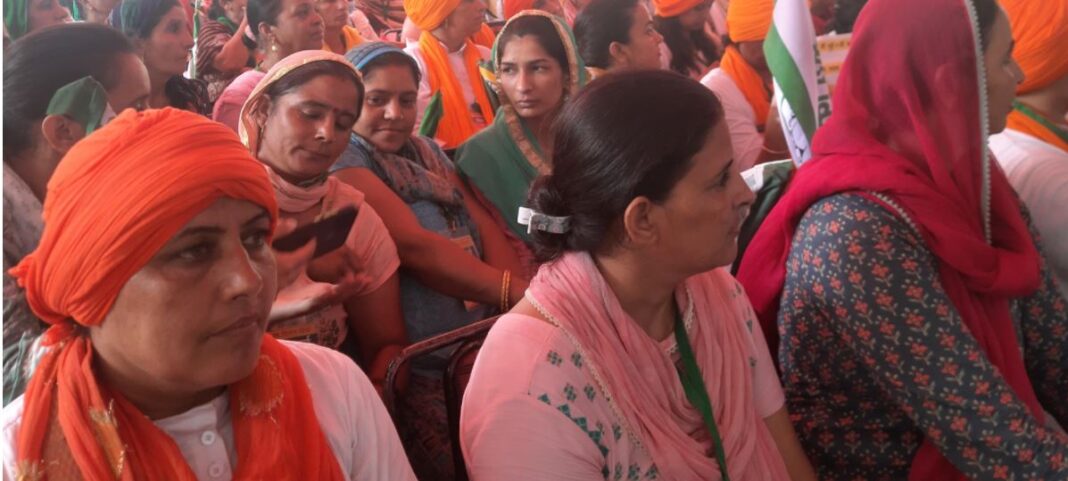[vc_row][vc_column][vc_column_text]
Driven by the spirit of naari shakti, 200 farm women pitch for their rights near to the Parliament House in Delhi.
They were in all 200 of them sitting under the overcast sky on one of those sultry July days of the year surrounded by several layers of security cordon. Speaker after speaker was taking to the podium of the makeshift rickety stage pouring out their anxieties and anger against the incumbent BJP government at the Centre. This was ‘mahila sansad’ (an assemblage of women) representing various women’s organisations of the country.
A few yards away majestically stands the Parliament House, a British era marvel, bearing witness to the ongoing all-women assembly while the monsoon session was in progress inside.
They might be small in number, but not in their grit and gumption. Fired by a rare of sense of naari shakti (woman power), each member of the assembly oozed the kind of confidence never seen before. These neo-feminists are out to achieve what their men are hoping to, but not without woman power. They are no longer second fiddle to men, but their equal partners; they are mahila kissan (woman farmers).


Each of these women may have represented Simone de Beauvoir in her individual capacity, but they all reiterated their collective representation of millions of women farmers who don’t want to accept gender discrimination in the name of Second Sex.
What’s it like being a woman in a patriarchal set-up where she is invariably neglected, her services largely go unacknowledged and she is forced to remain invisible in the farm sector. This is in contrast to most of the other developing countries where women are credited for producing 60 to 80% of food. Women produce almost half the food produced in the world.
But then, when have women had it easy when it comes to getting the recognition due to them. Leave alone their rights, society is not even ready to acknowledge their existence. Whatever little they have gained over the years is not without a long-drawn-out struggle. The women parliament under the open sky may not be a part of the first, second, third, or fourth wave of feminism. Nonetheless, it is an equal contender for the movement of equal rights in India.
When the country’s parliamentarians represented their respective constituencies in the august house during the monsoon session, these women represented themselves when they questioned as to why they, as women farmers, remained a neglected lot despite their disproportionately high contribution to the country’s economy.
The shadow parliament was held close on the heels of the Opposition making a fervent demand for a discussion on the issue of farmers in the country’s parliament. The members of the women parliament not only spearheaded the farmers’ movement but also took up the cause of the millions of women who contribute immensely to Rs 19.48 lakh crore (US$ 276.37 billion) farm industry of the country.
These women farmers have been part of the enduring protest on the outskirts of the National Capital along with their male counterparts since November 2020. They have braved rains, winter chills and sweltering summer heat alongside men, to pressurise the government to withdraw the farm laws passed by the Parliament in September 2020. During this eight-month-long protest, they have been pushing hard with their own demands as woman farmers and the recognition due to them as equal stakeholders in the agrarian economy.
The problem is not just the recognition of women as an independent force as a major contributor to the farm sector. There are issues relating to their struggle within their families for land rights, loans and transfer of land rights in their names etc. as the patriarchal values are loaded against them. According to a National Sample Survey Office (NSSO), the agrarian sector employs nearly 80% of women workers. Despite such a huge representation, they largely remain invisible or are merely acknowledged as labourers.
The only scheme meant exclusively for women under the Mahila Kisan Sashaktikaran Pariyojna (MKSP), affiliated to the National Rural Livelihood Mission, has a total of 57,270 Mahila Kissans registered through 5,816 local groups for taking up organic farming. Another 14.03 lakh women farmers come under the State Rural Livelihoods Mission and MKSP indicating that a large number of women are engaged in the sector. However, there is no consolidated data on the direct or indirect employment or engagement of women in the farm sector.
What these 200-odd women were fighting for on the Delhi roads was not only the question of millions of women farmers in India but also to change the mindset of the society against the women.
“For our society, only men are the farmers. The truth is that women outnumber men in agriculture even though they have the least land in their possession thanks to the discriminatory land-holding laws. What hurts us the most is that our contribution goes unrecognised,“ lamented a woman leader of the Bhartiya Kisan Morcha.
“We are looked upon as mere labourers, not as farmers that we are even though we do all kinds of jobs related to farming i.e. sowing, tilling, harvesting etc. Leave alone land rights we aren’t even supposed to demand our rightful share of the farm income. Women in India can only get their land rights transferred only through various personal laws. Traditionally, agricultural land in the country has been transferred through wills. Women have to face a lot of discrimination and resistance from their own families while claiming their possession of the land,” said another participant.
According to Global Greengrant Funds report, “Woman farmers, the invisible face of agriculture in India”, published on April 9, 2013, “in the Himalayan region of India a pair of Ox works 1,064 hours, a man 1,212 hours and a woman works 3,485 hours in a year in the farms”. The data is significant as testifies to an important contribution of women in the farm produce.
The history of feminism in India is particularly dominated by the fight against culture-specific issues within the patriarchal society and fight for equal inheritance laws has been one of the biggest challenges for the feminist movement.
Despite laws on their side, they have to struggle to change the patriarchal mindset. Social conditioning is such that it bars women from getting their due as equal stakeholders in the men’s world. While all other aspects of agriculture are dominated by men, the labour is left with the women. Thus women are deprived of their share and the right to make decisions about their land, produce and income.
While debating over the controversial farm laws, we lose sight of a longstanding demand for reforms to make the agricultural sector more women-friendly. We routinely observe National Women Farmers’ Day every year on October 15. It’s time we, as a nation, took some concrete steps to render justice to these farm women to demonstrate that we really care. We care for those who ensure our bread and butter, don’t we?
[/vc_column_text][/vc_column][/vc_row]
Disclaimer: We do undertake rigorous checks on content provided by contributors before publishing the same. If you come across some factual errors, kindly bring this into our notice and we shall review your objection and claim as per our policy and display correction credits and corrections on the article itself.
The opinion expressed in the article is of the writer. Writer is a freelance journalist/journalist based in Delhi




























